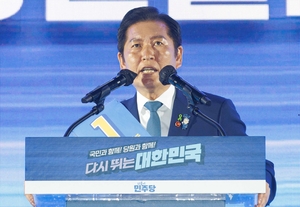 Rep. Jung Chung-rae, the newly elected leader of the ruling Democratic Party of Korea, speeches during the party’s national convention held at KINTEX in Goyang, Saturday. (Yonhap)
Rep. Jung Chung-rae, the newly elected leader of the ruling Democratic Party of Korea, speeches during the party’s national convention held at KINTEX in Goyang, Saturday. (Yonhap) Partisan divisions in South Korea are deepening as Rep. Jung Chung-rae, the newly elected chair of the ruling Democratic Party, declared he would not work with the main opposition People Power Party until it shows genuine remorse over its alleged ties to former President Yoon Suk Yeol’s Dec. 3 martial law declaration.
As the major conservative opposition expressed discontent over Jung’s remarks, Kim Hyun-jung, the Democratic Party’s floor spokesperson, said Sunday, “The People Power Party expressed concern over Rep. Jung Chung-rae’s election as party leader. But what they should really be concerned about is their own record of defending the Yoon administration’s insurrection and destruction of constitutional order.”
This followed Jung’s defeat of Rep. Park Chan-dae at the party’s convention for party leader on Saturday, when Jung said the People Power Party “must offer sincere reflection and apology” before anything else.
“I will not shake hands with them otherwise,” Jung told reporters following the convention.
He added, “Even if they do apologize, it may not be enough. As long as the People Power Party continues to defend Yoon, there can be no cooperation.”
Jung also warned of possible legal steps to disband the People Power Party.
“If the special counsel investigation finds that accomplices, abettors and collaborators exist within the People Power Party, public demand for filing a Constitutional Court petition to dissolve the party will grow,” Jung said. “At that point, I will make a prudent decision as party leader.”
This echoed his stance in his acceptance speech, in which he reiterated the Democratic Party’s commitment to rooting out what he called “insurrectionist forces.”
Throughout the leadership race, Jung maintained a hard-line stance, saying there would be “no compromise, no negotiation and no cooperation” with those involved in the Dec. 3 martial law plot.
In July, Jung proposed a revision to the Constitutional Court Act that would allow the National Assembly to vote on petitions seeking the dissolution of parties deemed unconstitutional — including other Democratic Party lawmakers who have proposed cutting off state subsidies to such parties — and submitted resolutions calling for the expulsion of People Power Party lawmakers allegedly involved in the case.
Jung also said the Democratic Party will press ahead with reforms in the prosecution, judiciary and broadcasting sectors, in line with President Lee Jae Myung’s policy agenda.
When asked whether he planned to meet People Power Party interim leader Song Eon-seog, Jung did not confirm but replied, “This is not about ruling and opposition parties anymore — it’s about those who tried to destroy democracy and those trying to protect it.”
The People Power Party pushed back.
“This is a declaration of war,” Rep. Ahn Cheol-soo, who’s running the People Power Party’s Aug. 22 leadership election, wrote on Facebook on Sunday, accusing Jung of signaling “an even more blatant legislative dictatorship and reckless lawmaking, emboldened by the ruling party’s overwhelming majority.”
“Stop talking about dissolving our party,” Ahn added.
People Power Party senior spokesperson Rep. Park Sung-hoon also urged Jung to respect the role of the opposition, saying his remarks reflected “an unprecedented level of hostility” from a ruling party leader.
flylikekite@heraldcorp.com
